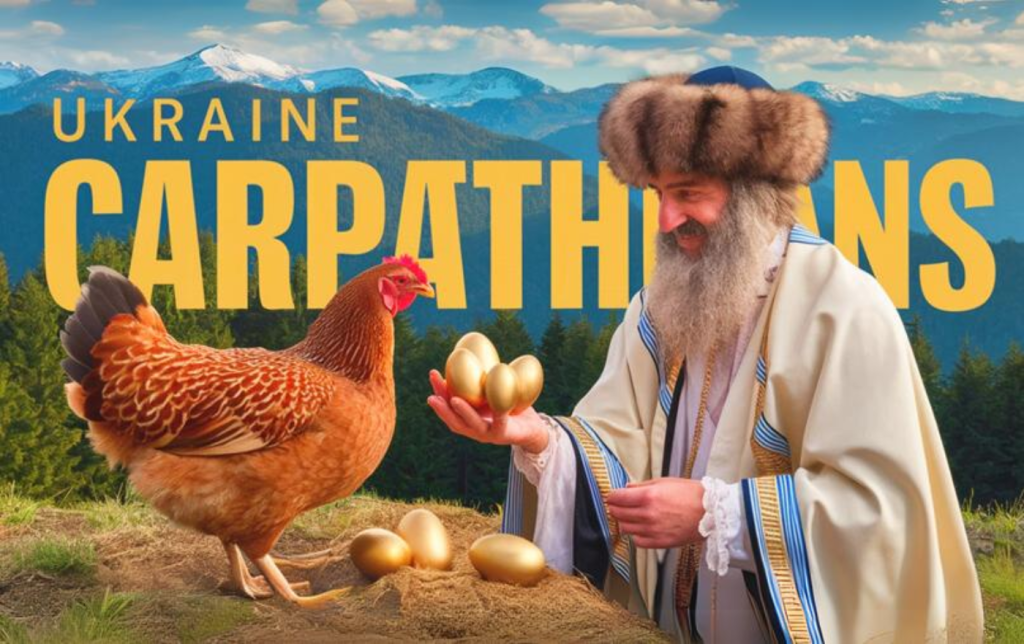"Rabbi’s Hen": A Jewish-Ukrainian ironic fairy tale
Fact: you can't read Russian folktales to Jewish children as they don't teach what is needed. I read "Ryaba the Hen" to my son, which left me in a mental shock.
The plot is as follows: an old man and an old woman had a hen named Ryaba. The hen laid not an ordinary egg but a golden one. Their initial reaction was primitive as they tried to break the egg. Why? Just to fill their bellies with scrambled eggs.
Instead, they should have tried to understand the essence of this phenomenon, taken the egg to a jeweler to determine the quality of gold, and then gotten the hen to lay new golden eggs regularly.
Then, the plot becomes even dumber: "The old woman cried; the old man cried." Why did they cry? Because the egg was not edible. How stupid! Any Jewish old man, and especially a Jewish old woman, would jump for joy if gold appeared in their possession and unbeknownst to the Tax Service to boot. Meanwhile, these fools cried.
Notice how the chicken calmed them down: "I will lay another egg for you, a simple one." Crazy! Instead of continuing to keep churning out golden eggs, the chicken adjusted its production profile to suit the wishes of these dumb egg-eaters.
The correct Jewish-Ukrainian fairy tale should be called "Rava the Hen" and have a completely different plot. In a small town in Subcarpathia, there lived a very righteous but very poor rabbi. He and his wife had absolutely no money and only three hens. On a Friday, Baal Shem Tov, the famous founder of Hasidism, and two of his disciples drove up in a cart to their house. BESHT said he would be happy to spend the Sabbath in the rabbi's house, so he cordially invited the guests to his place. The hosts had to slaughter and cook one hen, which the guests ate on Holy Saturday.
BESHT and his disciples left but returned the following Friday, and the same thing happened again. The rabbi slaughtered one of the two remaining hens and welcomed the guests with the same kindness and respect. As he was leaving, Baal Shem Tov said to the rabbi, "Well, thank you, and see you next Friday."
The rabbi was anxious, realizing that he had no money and only one hen left, while food was needed for both his family and the guests.
During the full moon in the month of Elul, the rabbi prayed to the Creator of the Universe, swallowing down tears: "Oh, merciful Father, you see my thoughts. They are pure, and I sincerely want to fulfill the commandment of hospitality. So, enable me to do good deeds with a sincere heart and to the fullest extent! Open to me the sources of your material blessings!"
The following day, the rabbi's wife discovered that their last hen had laid not an ordinary egg but a golden one! The rabbi harnessed his horse and rushed to Kolomyia to see Itzyk Kolomyisky, a Jewish jeweler he knew. The jeweler gave him ten gold coins for the egg. With this money, he bought a lot of food at the market and gifts for the entire family.
On the third Sabbath, BESHT and his disciples were treated to particularly delicious dishes. As they were leaving the hospitable rabbi, one disciple asked Baal Shem Tov: "Teacher, why did we come to the poor rabbi twice to eat his food?" BESHT answered: "It was revealed to me that great wealth was stored in Heaven for this rabbi. Only one thing was missing. This humble rabbi had to earnestly and sincerely ask the Creator to give him wealth!"
The hen began laying golden eggs daily, and the rumor about Rava the Hen spread throughout the region. Disciples started coming to the rabbi. Using the money from the golden eggs, he built a synagogue and a beit midrash (House of Learning), which became the most famous one from Chortkiv to Nadvirna.
The rabbi and the jeweler from Kolomyia jointly opened the first Private Bank in Subcarpathia, giving low-interest loans to Ukrainian peasants, the Polish nobility, and even the king himself. At the same time, poor Jews received interest-free loans from the bank.
Remembering the story about Rava the Hen, a young Hasid asked BESHT: Why was this story so complicated? Wouldn't it be easier for the Most High to let the poor rabbi discover a treasure with gold coins behind his stove, similar to how Isaac from Kraków dreamed that a treasure was hidden under a bridge in Prague? Baal Shem Tov took out a pipe from his mouth, a gift from the Carpathian leader Oleksa Dovbush, and answered: "If a miracle is enough, why give cash?"
Text and illustration (with the help of AI): Shimon Briman (Israel).
Translated from the Ukrainian by Vasyl Starko.




















